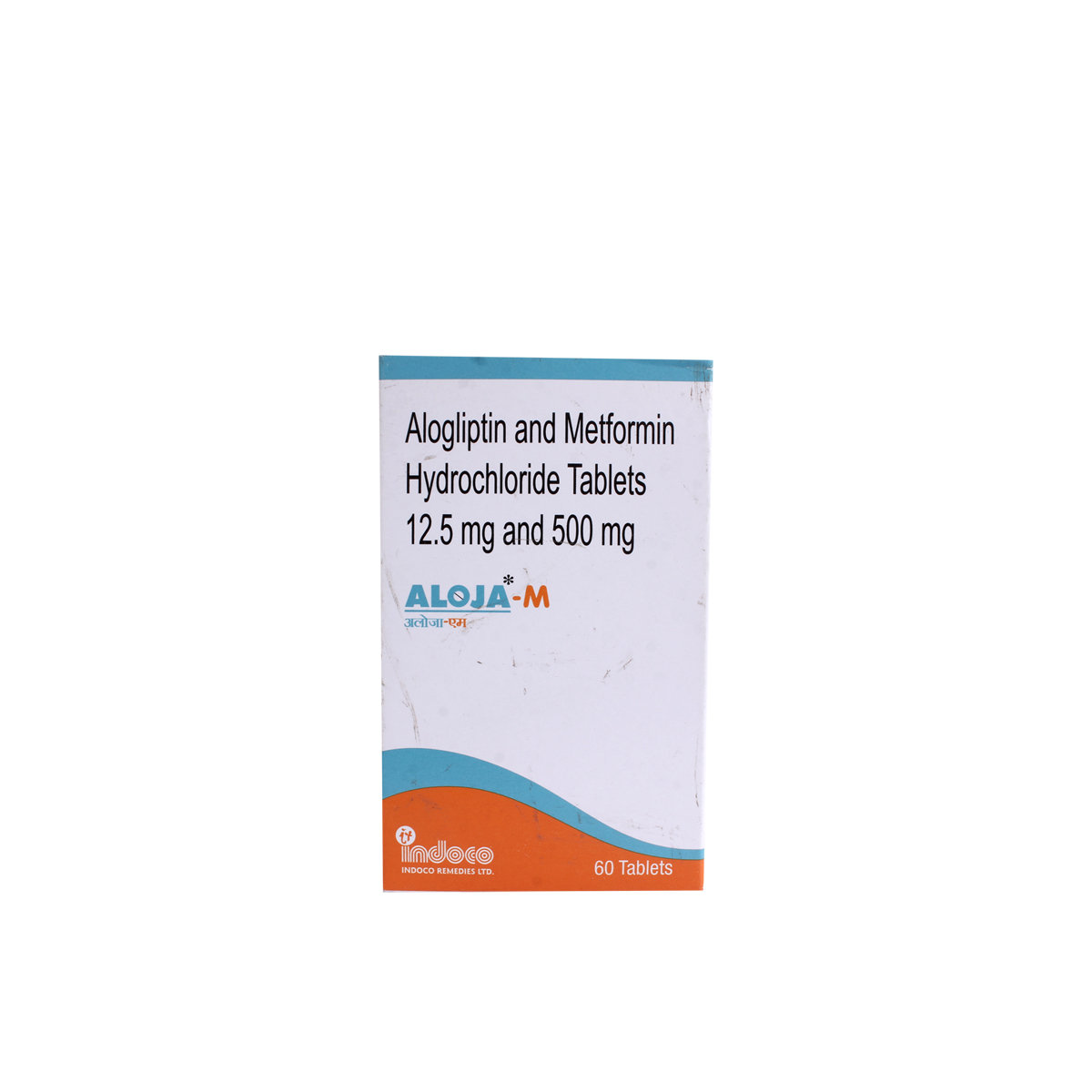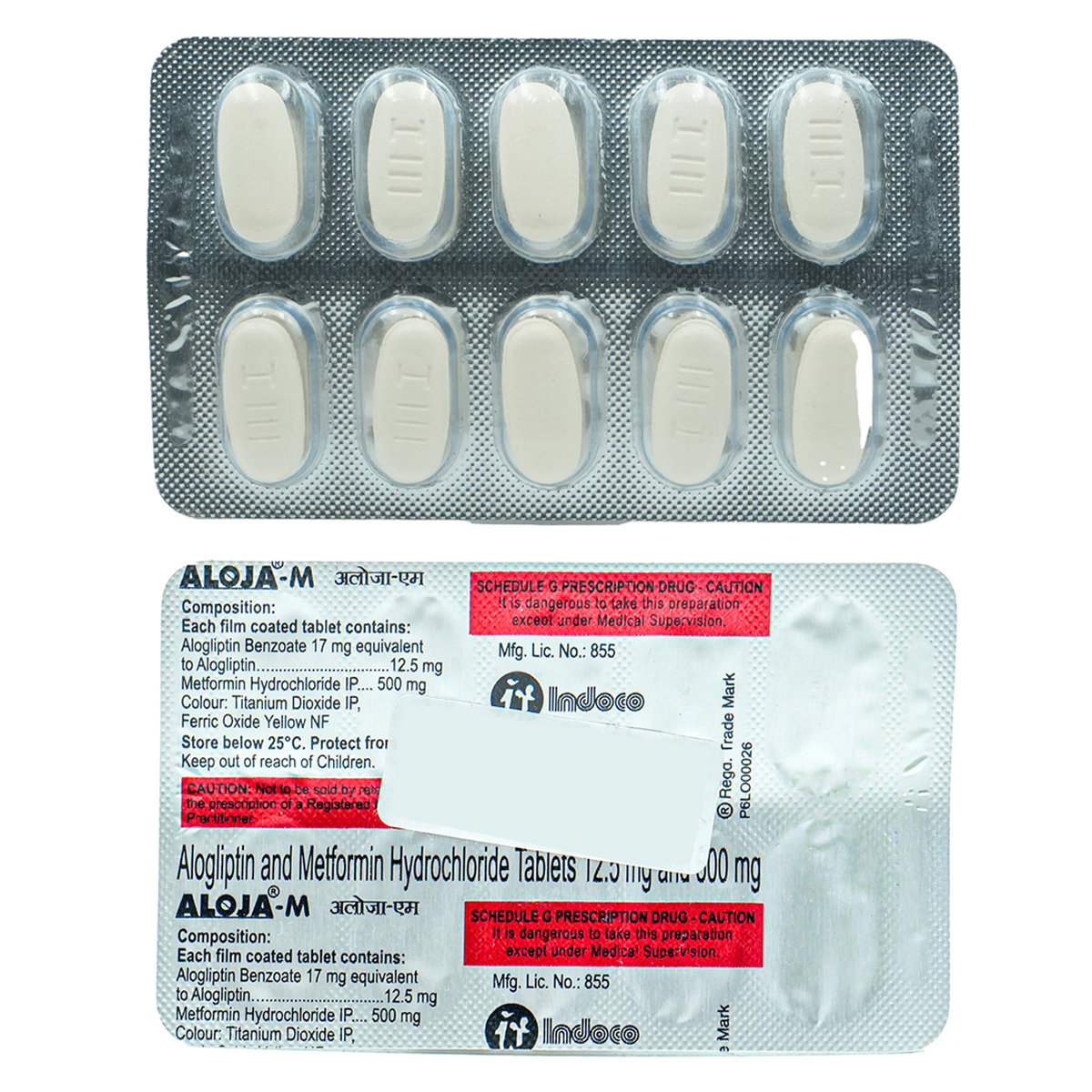Alogliptin+metformin
About Alogliptin+metformin
Alogliptin+metformin belongs to the group of anti-diabetic medicines used to treat type-2 diabetes mellitus in adults. Type-2 diabetes mellitus is also known as non-insulin-dependent diabetes mellitus or adult-onset diabetes. It is a medical condition in which blood glucose levels are above normal due to insulin deficiency, insulin resistance, or both.
Alogliptin+metformin contains Alogliptin and Metformin. Alogliptin works by increasing the levels of insulin in the body post-meal and decreasing the amount of sugar in the body. Metformin works by lowering the amount of sugar made in the liver and helps insulin to work more effectively. Together, Alogliptin+metformin helps control blood sugar levels.
You are advised to take Alogliptin+metformin for the prescribed period. In some cases, Alogliptin+metformin may cause common side effects such as stomach ache, diarrhoea, loss of appetite, nausea, and vomiting. Most of these side effects do not require medical attention and will resolve gradually over time. However, you are advised to consult your doctor if the side effects persist or worsen.
Alogliptin+metformin is not recommended if you are pregnant or breastfeeding and in children below 18 years. Avoid excessive alcohol consumption while taking Alogliptin+metformin as it might increase the risk of lactic acidosis. Keep your doctor informed about your health condition and medications to rule out any unpleasant side effects/interactions.
Uses of Alogliptin+metformin
Medicinal Benefits
Alogliptin+metformin belongs to the group of anti-diabetic medicines used to treat type-2 diabetes mellitus in adults. Alogliptin+metformin contains Alogliptin and Metformin. Alogliptin belongs to a group of medicines called DPP-4 inhibitors (dipeptidyl peptidase-4 inhibitors) which works by increasing the levels of insulin in the body post-meal and decreasing the amount of sugar in the body. Metformin belongs to a group of medicines called biguanides that works by lowering the amount of sugar made in the liver and helping insulin to work more effectively. Together, Alogliptin+metformin helps control blood sugar levels.
Directions for Use
Storage
Side Effects of Alogliptin+metformin
- Stomach ache
- Nausea
- Vomiting
- Diarrhoea
- Loss of appetite
Drug Warnings
Do not take Alogliptin+metformin if you are allergic to any of its components, if you have severely reduced kidney function, uncontrolled diabetes, severe hypoglycaemia, ketoacidosis (excess blood acid), severe infection, serious dehydration, severe circulatory problems, severe breathing difficulties, liver disease, if you had a recent heart attack or if you consume alcohol excessively. Inform your doctor if you have type 1 diabetes, pancreatic disease, or skin blisters. Alogliptin+metformin is not recommended if you are pregnant or breastfeeding and in children below 18 years. Alogliptin+metformin may cause a very serious side effect called lactic acidosis, especially if your kidneys are not working properly. The risk of developing lactic acidosis increases with uncontrolled diabetes, prolonged fasting, serious infections, dehydration, alcohol intake, liver problems or severe heart problems. Consult your doctor if you experience symptoms of lactic acidosis such as stomach ache, vomiting, muscle cramps, severe tiredness, difficulty breathing, reduced body temperature or heartbeat.
Drug Interactions
Drug-Drug Interactions: Inform your doctor if you are taking corticosteroids (hydrocortisone, prednisolone), antacids (cimetidine), bronchodilators, diuretics, pain killers (ibuprofen, celecoxib), anti-hypertensives (ACE inhibitors, angiotensin II receptor antagonists), and medicines containing alcohol.
Drug-Food Interactions: No interactions found/established.
Drug-Disease Interactions: Inform your doctor if you have severely reduced kidney function, uncontrolled diabetes, severe hypoglycaemia, ketoacidosis (excess blood acid), severe infection, serious dehydration, severe circulatory problems, severe breathing difficulties, or liver disease.
Drug-Drug Interactions Checker List:
Safety Advice

Alcohol
unsafeAvoid excessive alcohol consumption while taking Alogliptin+metformin as it may increase the risk of lactic acidosis.

Pregnancy
unsafeAlogliptin+metformin is not recommended in pregnancy as there are no adequate or well-controlled studies on pregnant women.

Breast Feeding
unsafeAlogliptin+metformin is not recommended during breastfeeding.

Driving
cautionAlogliptin+metformin may cause hypoglycemia; hence, avoid driving or operating machines if you experience the symptoms of hypoglycemia.

Liver
unsafeIf you have liver problems, inform your doctor. Alogliptin+metformin is not recommended in patients with liver problems.

Kidney
cautionDo not take Alogliptin+metformin if you have increased creatinine levels. Please consult your doctor if you have kidney impairment or any concerns regarding this. Dose adjustment may be needed.

Children
unsafeAlogliptin+metformin is not recommended for children below 18 years due to a lack of data.
Habit Forming
Diet & Lifestyle Advise
- Include foods rich in healthy carbohydrates and fibre, fruits, whole grains, and vegetables in your diet.
- Try eating food at regular intervals. Do not skip meals. Also, try not to overeat.
- Follow a healthy diet.
- Maintain a healthy weight by exercising regularly.
- Rest properly, and avoid stress by doing meditation or yoga.
Special Advise
- Inform your doctor if you are due to have any major surgery. Your doctor may advise you to stop taking Alogliptin+metformin during and for some time before and after the procedure.
- Your doctor may check kidney function at least once a year or more frequently if you are elderly or have worsening kidney problems.
Patients Concern
Disease/Condition Glossary
Type-2 diabetes mellitus: It is also known as non-insulin-dependent diabetes. It is a chronic or lifelong disease that keeps the body from utilizing insulin properly. People with type 2 diabetes either do not produce enough insulin, or the insulin produced cannot perform its function in the body (insulin resistance). Middle-aged or older individuals are most likely to suffer from type 2 diabetes; hence it is also known as adult-onset diabetes. Type 2 diabetes symptoms include lack of energy, tiredness, frequent urination, excess thirst, dry mouth, blurry vision, constant hunger, weight loss, and itchy skin.
FAQs
Alogliptin+metformin contains Alogliptin and Metformin. Alogliptin works by increasing the levels of insulin in the body post-meal and decreasing the amount of sugar in the body. Metformin works by lowering the amount of sugar made in the liver and helps insulin to work more effectively. Together, Alogliptin+metformin helps control blood sugar levels.
Do not stop taking Alogliptin+metformin without consulting your doctor, as it may cause an increase in blood glucose levels. Continue taking Alogliptin+metformin for as long as your doctor has prescribed it to you. Do not be reluctant to speak with your doctor if you experience any difficulty while taking Alogliptin+metformin.
Alogliptin+metformin may cause hypoglycaemia (low blood sugar) when it is taken in combination with insulin or sulphonylureas (such as glipizide, tolbutamide, and glibenclamide). Consume sugary food such as candy or fruit juice if you experience hypoglycaemic symptoms such as trembling, sweating, blurred vision, paleness, confusion, anxiety, tingling lips or mood changes. Regularly monitor blood glucose levels while taking Alogliptin+metformin.





